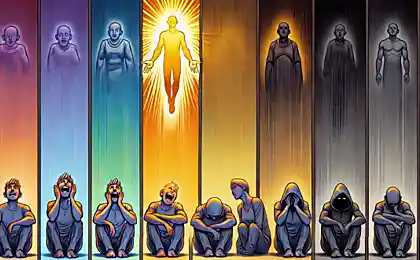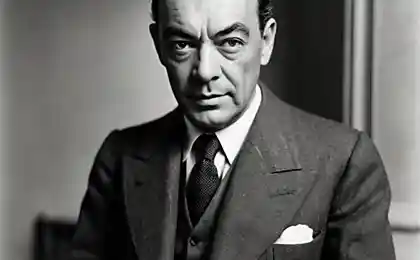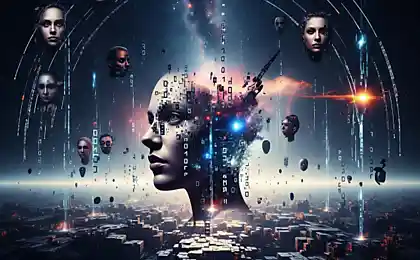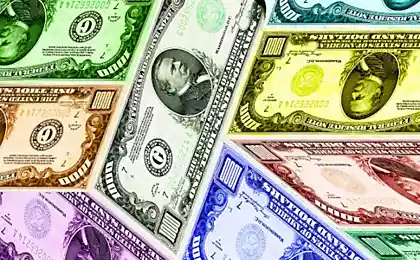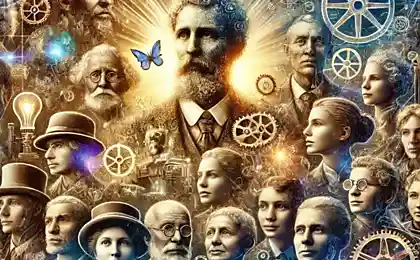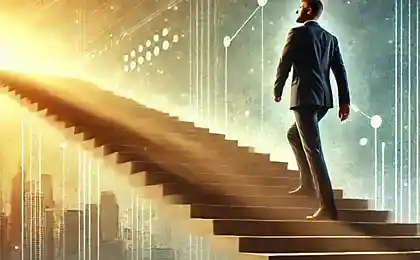144
Emotional Tone: Knowledge That Will Change Your Life

Imagine a world where you can predict the behavior of anyone, understand their underlying motivations, and even change their lives for the better. It is not a fantasy but a reality accessible through knowledge of the Emotional Tone, a concept developed by L. Ron Hubbard, the founder of Scientology. Emotional Tone is not just a fleeting mood, but the key to unlocking the human soul. In this article, we will reveal how the Emotional Tone Scale can become your compass in life, and talk about those who may have reached its top.
What is an emotional tone?
Emotional Tone is a measure of a person’s vital energy, their emotional state, which affects everything from decisions to relationships. L. Ron Hubbard created the Emotional Tone Scale to classify emotions and behaviors ranging from 0.0 (death) to 4.0 (enthusiasm). It’s not just an abstract theory; it’s a tool tested by observation and practice that allows us to see how emotions shape our reality.
We all live at a certain level of this scale. Someone gets stuck in apathy, and someone shines with enthusiasm. Understanding your tone and the tone of others opens the door to harmony and success. As Hubbard wrote, this knowledge can divide your life into before and after.
Emotional Tone Scale: A Map of the Human Soul
The Emotional Tone Scale is a ladder of emotions where each level reflects the state of consciousness and behavior. Here are her key steps:
- 0.0 - Death: Complete extinction, lack of spark of life.
- 0.05 - Apathy: Indifference, surrender to circumstances.
- 0.5 - Woe: Anguish, tears, a sense of hopelessness.
- 1.0 - Fear: Anxiety, indecision, escape from problems.
- 1.5 - Anger: Rage, the desire to destroy or control.
- 2.0 - Antagonism: Conflict, struggle with the surrounding world.
- 2.5 - Boredom: A slight indifference, a lack of purpose.
- 3.0 Conservatism: Careful interest, stability.
- 3.5 - Fun: Joy, lightness, pleasure of being.
- 4.0 - Enthusiasm: Energy, inspiration, the ability to change the world.

Your “chronic tone” is the level where you spend the most time. But the tone can fluctuate: loss brings us down and victory lifts us up. Knowing this scale, you can not only analyze yourself, but also predict the reactions of others.
How does this work in practice?
Imagine your colleague shouting at a meeting (1.5 – Anger). Instead of engaging in an argument, you lower the tone of communication to empathy, and the conflict fades away. Or your friend in apathy (0.05) says it's pointless. You ask him a question that sparks interest, and he comes to life. This is the magic of the Tone Scale in action.
The story of Anna, a 34-year-old teacher from Moscow, is an example. She lived in fear (1.0) for years, fearful of losing her job. After learning about the Scale, Anna began to notice her emotions and surround herself with people with a higher tone. A year later, she opened an online course and rose to fun (3.5). “It was like waking up,” she says.
Life hacks for managing emotional tone
Do you want to raise your voice or help others? Here are the proven ways:
- Watch yourself: Write down your emotions throughout the day. Where are you on the scale? This is the first step to change.
- Move it. A walk or sport drives out stagnant negativity, raising the tone.
- Look for inspiration: Read books, watch movies, or talk to people who light you up.
- Adjust to others: Talk to the person in their tone to find a common language.
- Do the right thing. Helping others raises the tone by giving a sense of importance.
Top 100: People with the highest emotional tone
Who are these people living at the level of enthusiasm (4.0)? We have compiled a list of 100 individuals whose vitality, creativity and positive impact inspire millions. This is not an official rating, but a selection of those who demonstrate the qualities of the highest tone according to Hubbard:
- Nelson Mandela A leader whose resilience and kindness changed history.
- Mahatma Gandhi A symbol of nonviolent resistance.
- Mother Teresa. - She devoted her life to helping the poor.
- Martin Luther King - Civil rights activist.
- Albert Einstein A genius whose ideas changed the world.
- Leonardo da Vinci The universal genius of the Renaissance.
- Vincent van Gogh An artist whose passion is visible in every stroke.
- Frida Kahlo An artist who transformed pain into art.
- Steve Jobs. An innovator who inspired millions.
- Elon Musk A pioneer of space and electric vehicles.
- Serena Williams. An athlete whose strength extends beyond the court.
- Maya Angelou A poet whose words heal.
- Dalai Lama A spiritual leader who preaches peace.
- Oprah Winfrey. - Media mogul and philanthropist.
- beyonce An artist whose energy powers stadiums.
- Malala Yousafzai - Activist for girls' education.
- Greta Thunberg An environmental activist who inspires young people.
- Eckhart Tolle A writer who carries the light of awareness.
- Richard Branson An entrepreneur who lives to the fullest.
- J. K. Rowling. A writer who created a magical world.
- Bill Gates Philanthropist changing the world through technology.
- Michelle Obama - Education and health advocate.
- Angela Merkel - A politician, a symbol of stability.
- Jeff Bezos Founder of Amazon, pioneer of e-commerce.
- Tim Cook. — CEO of Apple, the successor of the legacy of Jobs.
- Mark Zuckerberg The creator of Facebook, changing communication.
- Larry Page Co-founder of Google, revolutionary search.
- Sergey Breen Co-founder of Google, innovator.
- Jack Ma. Founder of Alibaba, a symbol of entrepreneurship.
- Warren Buffett An investor known for his wisdom.
- Richard Feynman. A physicist whose passion for knowledge is contagious.
- Stephen Hawking A scientist who uncovered the secrets of space.
- Neil Armstrong - The first man on the moon.
- Yuri Gagarin - First man in space.
- Valentina Tereshkova - The first woman in space.
- Amelia Earhart. - An aviation pioneer.
- Rosa Parks. - A symbol of equality.
- Helen Keller. An activist who has overcome blindness and deafness.
- Eleanor Roosevelt - Human rights advocate.
- Florence Nightingale The founder of modern nursing.
- Maria Curie. - Scientist, twice Nobel Prize winner.
- Ada Lovelace. - First programmer.
- Grace Hopper. - A computer science pioneer.
- Catherine Johnson A mathematician whose calculations helped NASA.
- Shirley Jackson. A physicist whose research has changed telecommunications.
- Vanga A visionary whose predictions inspired.
- Edgar Casey. A mystic known as the “sleeping prophet.”
- Rudolf Steiner Philosopher, founder of anthroposophy.
- Paracelsus A physician and alchemist, ahead of his time.
- Nikola Tesla. An inventor whose ideas were ahead of time.
- Thomas Edison. - The inventor who gave the light.
- Alexander Graham Bell - Inventor of the telephone.
- Henry Ford. An industrialist who revolutionized production.
- Walt Disney. Creator of the magical world of cartoons.
- Stan Lee A comic book legend, the creator of superheroes.
- George Lucas. The director who gave Star Wars.
- Steven Spielberg A filmmaker whose films touch the heart.
- Akira Kurosawa A director whose influence is limitless.
- Federico Fellini - Master of surrealism in film.
- Ingmar Bergman A director who explores the human soul.
- Andrei Tarkovsky A movie poet whose films are meditation.
- Leo Tolstoy A writer whose works are eternal.
- Fyodor Dostoevsky - Researcher of human psychology.
- Ernest Hemingway - Master of laconic style.
- Gabriel Garcia Marquez - The magician of magical realism.
- Haruki Murakami - A writer whose worlds fascinate.
- Pablo Picasso An artist who turned art around.
- Salvador Dali A surrealist whose images are shocking.
- Francisco Goya An artist who reflected the horrors of war.
- Claude Monet - Master of light and color.
- Vasily Kandinsky - A pioneer of abstractionism.
- Antonio Gaudi An architect whose buildings are a fairy tale.
- Frank Lloyd Wright Architect who harmonized nature and the building.
- Le Corbusier - Architectural revolutionary.
- Zaha Hadid An architect whose forms are futuristic.
- Isaac Newton A scientist who discovered the laws of nature.
- Charles Darwin A Biologist Who Changed the View of Evolution
- Sigmund Freud - Founder of psychoanalysis.
- Carl Jung A psychologist who has studied the collective unconscious.
- Abraham Maslow Psychologist, creator of the pyramid of needs.
- Victor Frankl A psychiatrist who has found meaning in suffering.
- Mikhail Bulgakov A writer whose Master and Margarita is a masterpiece.
- Anton Chekhov - Master of short storytelling.
- Virginia Woolf - Writer, experimenter of style.
- James Joyce Author of Ulysses, a literary revolutionary.
- Tony Morrison A writer whose novels are about racial identity.
- Chinua Achebe Nigerian writer, voice of Africa.
- Isabel Allende A Chilean writer whose stories are about love and loss.
- Jorge Luis Borges Argentine master of short prose.
- Paulo Coelho A Brazilian writer who inspires millions.
- Robert Frost. A poet whose poems are about nature and life.
- Emily Dickinson. A poet whose poems are a mystery.
- William Shakespeare - The greatest playwright of all time.
- Jane Austen. A writer whose novels are about love and society.
- Charles Dickens. Master of Social Criticism through Literature.
- Mark Twain American humorist and satirist.
- Jack London A writer of adventure and survival.
- F. Scott Fitzgerald - Author of The Great Gatsby.
- John Steinbeck A writer whose novels are about the human spirit.
- Rabindranath Tagore - Indian poet and philosopher.
- Omar Khayyam A Persian poet whose words about life are eternal.
Glossary
Emotional Tone: The level of emotional energy of a person, measured by the Tone Scale.
Emotional Tone Scale: The 0.0 to 4.0 emotion classification system created by Hubbard.
Chronic Tone: A constant level of tone, typical for a person.
Enthusiasm (4.0): Higher energy and inspiration.
Your "after" begins now.
Emotional Tone is not just knowledge, but a guide to action. Start small: define your tone, be inspired by those at the top. The world won’t change, but you can change your place in it. Which tone will you choose?
15 signs of a mature personality. Are you sure you've grown up?
8 Signs That Negative Became Your Personality


